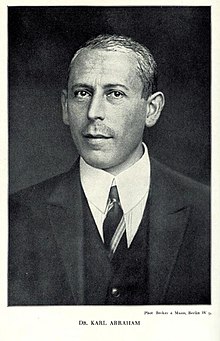Karl Abraham



Karl Abraham (born May 3, 1877 in Bremen , † December 25, 1925 in Berlin ) was a German neurologist and psychiatrist and as such an important representative of psychoanalysis and its pioneer in Germany.
biography
job
Abraham studied medicine in Würzburg and Berlin, where he received his neurological training, and did his doctorate in Freiburg im Breisgau . From 1904 to 1907 he was Eugen Bleuler's assistant at Burghölzli in Zurich . During this time he was introduced to psychoanalysis by C. G. Jung . He was a pupil and close confidante of Sigmund Freud and took part in his Wednesday association in Vienna before he settled in Berlin in 1907 as a neurologist ("specialist in nervous and mental illnesses") and in 1908 founded the Berlin Psychoanalytic Society . In 1920, together with Max Eitingon , he founded the Berlin Psychoanalytic Institute , where many famous analysts were trained or taught (e.g. Erich Fromm , Michael Balint and René A. Spitz ).
Karl Abraham's pupils were Franz Alexander , Felix Boehm , Helene Deutsch , Rudolf Foerster , Edward Glover , James Glover , Karen Horney , Melanie Klein , Hans Liebermann , Josine Müller (born Ebsen; 1884–1930), Carl Müller-Braunschweig , Sándor Radó , Theodor Reik , Ernst Simmel , Alix Strachey (1892–1973).
Karl Abraham supplemented Sigmund Freud's psychosexual development theory with additional (sub) phases:
- Earlier oral (sucking) stage: autoerotism; objectless; pre-ambivalent
- Later oral (cannibalistic) stage: narcissism; Total incorporation of the property
- Earlier anal-sadistic stage: partial love with incorporation
- Later anal-sadistic stage: partial love
- Early genital (phallic) stage: object love with genital exclusion
- Final genital stage: object love; post-ambivalent
Furthermore, from a psychoanalytical perspective, he has dealt with dream symbolism , parent-child relationships , ethnology , neuroses and psychoses, and art .
family
Karl Abraham was (from January 1906) married to Hedwig Abraham (née Bürgner, * 1878, † 1969). They both came from Jewish families. Karl Abraham met Hedwig as the sister of his friend Hans Bürgner, a Berlin lawyer and notary, in 1901 in Berlin. Hedwig Abraham and her children, Hilda (* 1906 in Zurich, † 1971) and Grant (* 1910 in Berlin, †?), Escaped Nazi persecution by fling to England in 1938.
Honors
- Abraham was buried in the Lichterfelde park cemetery in Berlin-Lichterfelde . The grave is one of the honor graves of the State of Berlin .
- In Berlin, two memorial plaques commemorate Karl Abraham: one on his former home at Bismarckallee 14 and, since 2006, another from the Mit Freud series in Berlin at Rankestrasse 24.
- In 1970, on the occasion of the 50th anniversary of its founding, the Berlin Psychoanalytic Institute gave itself the name of its co-founder, Karl Abraham, and has since been called the Karl Abraham Institute .
- In 2012, a street in his native Bremen was named after Karl Abraham.
Works
- Psychoanalytic Studies. Collected works in two volumes. Edited and introduced by Johannes Cremerius . 2 volumes. Reprint (of the 1971 edition). Psychosozial-Verlag, Giessen 1999.
- Sigmund Freud, Karl Abraham: Letters 1907–1926. Edited by Hilda C. Abraham and Ernst L. Freud. 2nd, corrected edition (1st edition 1965). S. Fischer, Frankfurt am Main 1980.
- Sigmund Freud, Karl Abraham: Correspondence 1907–1925. Edited by Ernst Falzeder and Ludger M. Hermanns. 2 volumes. Complete edition. Turia + Kant, Vienna 2009 (online at the OAPEN Library: Volume I , Volume II ).
literature
- Hilda Abraham: Karl Abraham. His life for psychoanalysis. Kindler, Munich 1976, ISBN 3-463-00650-2 .
- Johannes Cremerius : Karl Abraham. His contribution to psychoanalysis. In: Dieter Eicke (ed.): The psychology of the 20th century. Vol. 2, Kindler, Zurich 1976, pp. 154-166.
- Alma Kreuter: Abraham, Karl. In: German-speaking neurologists and psychiatrists. A biographical-bibliographical lexicon from the precursors to the middle of the 20th century. Saur, Munich 1996, Vol. 1, pp. 1-4 ( limited preview in the Google book search).
- Brigitte Kaderas: Karl Abraham's efforts to teach psychoanalysis at the Friedrich Wilhelms University. Source edition of the “Memorandum of the Berlin Psychoanalytical Association on the Introduction of Psychoanalytic Teaching at the Berlin University” and its rejection. In: Yearbook for University History . Vol. 1 (1998), pp. 105-232.
- Michael Laier: Abraham, Karl. In: Werner E. Gerabek , Bernhard D. Haage, Gundolf Keil , Wolfgang Wegner (eds.): Enzyklopädie Medizingeschichte. Walter de Gruyter, Berlin and New York 2005, ISBN 3-11-015714-4 , p. 3.
- Josef Rattner : Karl Abraham . In: Classics of Psychoanalysis . 2nd edition Beltz / Psychologie Verlags Union, Weinheim 1995, ISBN 3-621-27285-2 . (First edition 1990 and T. Klassiker der Tiefenpsychologie ), pp. 115–134.
- Elisabeth Roudinesco , Michel Plon: Abraham, Karl. In: Dictionary of Psychoanalysis. Names, countries, works, terms. Springer, Vienna 2004, pp. 2-4 ( limited preview in Google book search).
- Abraham, Karl. In: Lexicon of German-Jewish Authors . Volume 1: A-Benc. Edited by the Bibliographia Judaica archive. Saur, Munich 1992, ISBN 3-598-22681-0 , pp. 6-12.
Footnotes
- ↑ In future, Karl-Abraham-Straße , Weser Kurier of November 26, 2012:
- ↑ Pupils and guides. The psychoanalyst Karl Abraham (review by Eva Jaeggi, 1999) ( Memento from October 27, 2007 in the Internet Archive )
Web links
- Literature by and about Karl Abraham in the catalog of the German National Library
- Karl Abraham in the Internet Movie Database (English)
- Biographical information on the website of the German Psychoanalytic Society
- Website of the Berlin Psychoanalytic Institute Karl Abraham Institute eV
| personal data | |
|---|---|
| SURNAME | Abraham, Karl |
| BRIEF DESCRIPTION | German psychoanalyst |
| DATE OF BIRTH | May 3, 1877 |
| PLACE OF BIRTH | Bremen |
| DATE OF DEATH | December 25, 1925 |
| Place of death | Berlin |
